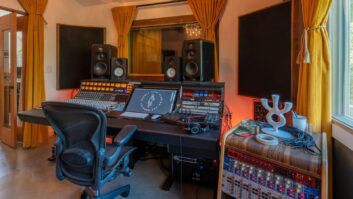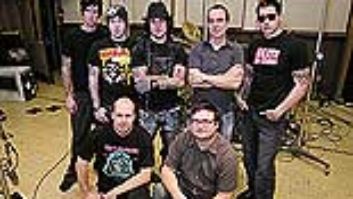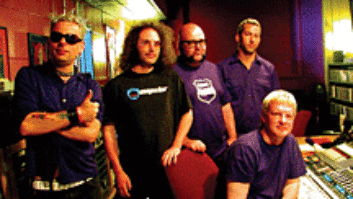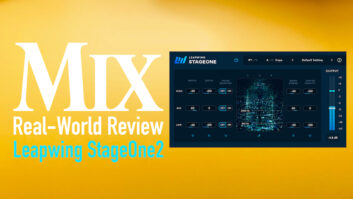Following up Platinum success always brings its share of challenges, but for Powerman 5000, creating the follow-up to 1999’s Tonight the Stars Revolt! required a combination of checks and balances. “There is a lot of pressure, and it’s usually from outside sources,” says the group’s frontman, lyricist and savvy businessman, Spider One. “The first step is to nod politely and smile when our manager and A&R people say, ‘Do this and this.’ Then we forget about it and do what we do. I have no idea what the ‘right lyrics’ and ‘right songs’ are, or I would have written them 10 years ago and sold 10 million albums. Whatever people liked about your band last time, do it louder and faster, but if you think about that too much, you overthink your band and record, and it ends up a mess. Do what you do, realize your limitations and do the best you can with the style you’ve created.”
P5k’s music is steeped in modern technology and current sounds, but the band pays its respects to artists who preceded and inspired them. The combined efforts of Spider, guitarists Adam 12 and M. 33, bassist Dorian 27 and drummer Al 3 are more akin to Ziggy Stardust or Space Oddity than freshly baked Bizkit. However, this didn’t deter the group from recruiting veteran hard rock producer Terry Date to oversee their new project — P5k’s third label effort and fifth release. Date’s resume reads like a who’s who of hard rock and metal acts: Limp Bizkit, Deftones, Buckcherry, Staind, Jane’s Addiction, Incubus, Pantera, White Zombie, Soundgarden, Mother Love Bone, Helmet, Prong, Sanctuary, Fishbone, 24-7 Spyz, Metal Church, The Accused and Dream Theatre. He’s even been nominated for two Grammy awards: Best Hard Rock Album for Limp Bizkit’s Significant Other, which sold 6 million copies, and Best Engineered Album for White Zombie’s double-Platinum Astro Creep: 2000.
“Again, it’s about balance,” says Spider of the band’s decision. “There is a certain truth to [the fact that Terry Date is the “metal” guy]. But you have to be aware of what’s going on in your world. Just because I don’t listen to Slipknot or Limp Bizkit when I go home doesn’t mean I haven’t heard their records. I know that our fans are their fans. When you play that music all day, it’s not what you want to listen to during your time off. But of all those records, Terry made the best ones, and he’s the person everyone in the band agreed on. His consistency level is really high, which isn’t the case with a lot of producers — they do one record you like, and then 10 more and you go, ‘Why did he do that?’ We wanted this record to be a little looser, so you go for what you know. Terry knows that world.”
Born in Michigan, Date grew up in Cleveland and Cincinnati, attended college in Idaho and continued his education at Eastern Washington University, near Spokane. His climb to the top of the production ladder began with running the board for bands back home, working at college radio stations, recording local acts on a 4-track tape recorder, relocating to Seattle after college and becoming staff engineer at Steve Lawson Productions. He landed in Seattle shortly before the city’s burgeoning music scene exploded. In 1984, the local band Metal Church chose Date to engineer their first album. When that group signed with Elektra, gave Date co-production credit and then sold a quarter-million albums, his phone started ringing and hasn’t stopped since.
“My methods of making a record are basically the same today as they were then,” Date says. “Music has definitely changed, and the biggest change, technically, of course, is computers. So we have to adapt to new sounds and new toys. But I basically work the same way I always have: I still use tape heavily. I use computers more and more, but the final product starts and ends on tape. The computer is in between those stages, although I still use it sparsely. I don’t manipulate the music too much. I use it for things like backward reverb, where I’d have to flip the tape — it takes less time on computer. For certain effects, the computer is an easier medium to work with, but I’m more comfortable with tape. That’s been the biggest change for me other than a new piece of equipment here and there.”
P5k began recording this album in early January at NRG Studios in Los Angeles. Date produced and engineered, assisted by his “full-time right hand” Scott Olson, with whom he has worked for three years. “NRG is a studio I love,” Date says. “I love the management, and it’s always fun to work there because they have great gear. It couldn’t be better.” Mixing was done at Larrabee West Studios, “another place that sounds great and is managed and run very well.” While “equipment changes day to day and week to week, so I like to experiment,” Date says that some things are a given whenever he’s at work. “I always have my own vintage EQs,” he notes. “I carry a rack with Neve 1081s and Focusrite 110s. I don’t carry my own compressors; we use those at the studios, because they have what I like: UREI 1176s. That’s really the only gear I’ll use as outboard. Processing stuff, I use an old, discontinued 9050 Zoom. I use a SansAmp Tech 21 PSA 1 for distortion and addition to sounds I need to add flavor to. Those are probably the most consistent things I use.
“On this album, I used all of that and a lot of Shure microphones. For vocals, we used a Shure 58 and [a Neumann] 47. Outboard gear for vocals was an old vintage Roland vocoder. I’m also using an old ART Powerplant, and that’s pretty much it. We used a lot of assorted foot pedals. I tend to find what’s laying around and see if it sounds good.”
Date says he prefers to stay out of pre-production, opting instead to have bands send him demos of the work in progress. For P5k, this was another advantage. “We’re definitely a band who has a good idea of what we want to do, and we’ve never required a producer who is also a songwriter,” says Spider. “We like somebody who, most importantly, gets it, gets the sound we want and has the sonic ability to make it happen, to translate what you hear in your head to CD and keep that energy. Terry is a no-nonsense producer. Some producers do odd things to create a mood or mike an instrument a certain way. Terry is from the school of, ‘I know what I’m doing, and I’ve been doing it forever.’ He doesn’t need bizarre rituals or group prayers or blue candles. We get down to business, and it’s like the road: You have to get up there and do it. That’s my philosophy in the studio and on tour. From the practical side, we don’t spend a lot of time or waste money. A lot of bands like to brag that they spent six months and $10 million on their album — doing what? Good move, genius — you’ll never make a dime!”
Date still regularly engineers the projects he produces. “I hear the music better and can make a better record when I wear both hats,” he says. “I started as an engineer, and I connect with the music through the board. I’ve never done a record where I was not involved 100 percent in the engineering side too — with the exception of the computers. I use them, but I don’t run them.” He selects his projects based on “incredible talent and creative musicians.” “Then,” he says, “my job is to expand on that creativity with them and make sure that they perform beyond what they thought they could do. But it has to start with them having that to begin with.”
This was certainly no problem with P5k, whose albums are often an exercise in unique effects and unusual sounds tied together — not always deliberately — by a story line of sorts. “It was never intentional to do that on [Tonight the Stars Revolt!],” says Spider, “but you write an album within a short period of time and hit on all these themes. I’ve always loved records that were a bit of a journey. The reference points I use are Public Enemy’s It Takes a Nation of Millions to Hold Us Back, which has no silence [between songs], and the soundtrack to The Monkees’ movie, Head. That’s an amazingly sequenced record. So I wanted to do that again and take it further. I don’t like having 10 to 12 songs in a row with a second of silence between each. I think of things in a visual sense, where things connect like a movie or one big story, but not intentionally; not like Pink Floyd’s The Wall.”
P5k’s music is full of textures and tones weaving in and out in an almost 3-D way. However, what many listeners mistakenly interpret as keyboards and tape loops are, in fact, guitars and drums. “We recorded over half of this record as a live band, and the rest of the record was a partial band,” says Date. “Every song they plugged in and played. The only thing that wasn’t done all at once was the vocals with the music, which I rarely do anymore. But half the record is everybody in the room. All the songs were designed to be played live. This wasn’t, ‘Play one note, and I’ll make the record for you.’ It’s a typical old-school recording where the band plays and you pick things that need to be fixed. The other half was played partially because of the rhythmic loops — classic rhythmic loops, not taking the song and adding a cymbal over it. There are some atmospheric keyboard lines involved, but we recorded everything as a band.”
My methods of making a record are basically the same today as they were then. Music has definitely changed, and the biggest change, technically, of course, is computers. So we have to adapt to new sounds and new toys.
— Terry Date
“We live in a world of computers,” says Spider, “so we sequence things and use loops and effects. But the stuff on top of that are guitar lines, vocals. It’s like building a house. The foundation is level, and the rest you make up as you go along. You have to be prepared enough not to waste time, but if you’re too prepared, you’ll convince yourself that everything should sound a particular way.
“It’s difficult to put a label on what we do, but I realize that no one in music is reinventing the wheel. Every band likes to think of themselves as compelling and original, but we’re all recycling what we’ve heard. In this band, we have the ability — not even an intentional ability — to create what we like, fail miserably at it, but come up with something cool anyway.”





